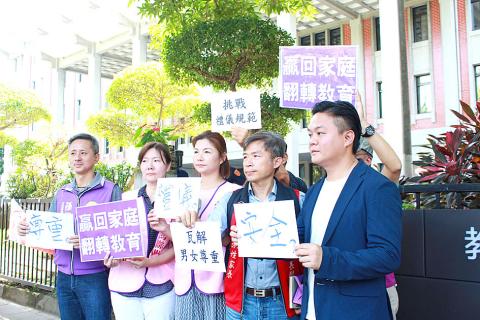Several parents’ organizations yesterday staged a protest in front of the Ministry of Education building in Taipei against a public high school’s decision to allow male students to wear skirts to school.
The demonstrators, holding placards that read: “Win Family Back, Reverse Education,” voiced their strong opposition to a decision by New Taipei Municipal Banqiao Senior High School to relax its dress code for students.
They said that gender equality education in the nation is focused on students’ “rights,” but does not promote the idea of “responsibility.”

Photo: CNA
“The boundaries between men and women are being broken. Where does a skirt-wearing male student go when the call of nature comes?” Hung Chih-ho (洪志和) of the Kaohsiung City Parents Alliance said.
“Without boundaries, how will boys treat girls with respect?” he asked.
Exposing one’s chest and back, and other “inappropriate” dress codes does not promote respect, Hung said.
“Children like to do something wacky, to be different from others, to draw people’s attention, but now boys are to be allowed to wear skirts to school, with the school calling the change respect for students’ right of autonomy,” he said.
It is not respect, but skirting responsibility, Hung said.
The protesting groups, including the Taiwan Mothers Shield Alliance and the Parents Association, issued a statement saying the school is misleading children into believing that allowing boys to wear skirts is gender equality.
They also expressed concern that boys might be allowed to use restrooms for girls.
They said that schools should teach students more about values and self-discipline to be able to make the right judgement.
Banqiao Senior High School on Monday confirmed that starting from the new school semester in September, it would allow male students to wear skirts to school, in a move to promote gender equality.
Student Affairs Division head Lin San-wei (林三維) said the school last month scrapped a regulation regarding students’ dress code, which originally stipulated that male students can only wear pants.
Scrapping the rule means that male students can wear skirts to school if they choose to, without facing punishment, while female students can continue to wear either skirts or pants, Lin said.
Asked about the protest, Huang Ching-yi, a deputy division head at the ministry’s Department of Student Affairs, told reporters that Banqiao Senior High School’s decision was made through a democratic process that involved discussions among teachers, students, parents and administrative staff at the school.
The ministry’s guidelines for dress codes state that senior high school authorities can make changes to their dress code and hair policies, as long as they consult students and parent representatives and democratic procedures are observed, Huang said.
The ministry is soliciting public opinion on whether the guidelines should be applied to junior-high and elementary schools, she added.

A preclearance service to facilitate entry for people traveling to select airports in Japan would be available from Thursday next week to Feb. 25 at Taiwan Taoyuan International Airport, Taoyuan International Airport Corp (TIAC) said on Tuesday. The service was first made available to Taiwanese travelers throughout the winter vacation of 2024 and during the Lunar New Year holiday. In addition to flights to the Japanese cities of Hakodate, Asahikawa, Akita, Sendai, Niigata, Okayama, Takamatsu, Kumamoto and Kagoshima, the service would be available to travelers to Kobe and Oita. The service can be accessed by passengers of 15 flight routes operated by

GIVE AND TAKE: Blood demand continues to rise each year, while fewer young donors are available due to the nation’s falling birthrate, a doctor said Blood donors can redeem points earned from donations to obtain limited edition Formosan black bear travel mugs, the Kaohsiung Blood Center said yesterday, as it announced a goal of stocking 20,000 units of blood prior to the Lunar New Year. The last month of the lunar year is National Blood Donation Month, when local centers seek to stockpile blood for use during the Lunar New Year holiday. The blood demand in southern Taiwan — including Tainan and Kaohsiung, as well as Chiayi, Pingtung, Penghu and Taitung counties — is about 2,000 units per day, the center said. The donation campaign aims to boost

ENHANCING EFFICIENCY: The apron can accommodate 16 airplanes overnight at Taoyuan airport while work on the third runway continues, the transport minister said A new temporary overnight parking apron at Taiwan Taoyuan International Airport is to start operating on Friday next week to boost operational efficiency while the third runway is being constructed, the Ministry of Transportation and Communications said yesterday. The apron — one of the crucial projects in the construction of the third runway — can accommodate 16 aircraft overnight at the nation’s largest international airport, Minister of Transportation and Communications Chen Shih-kai (陳世凱) told reporters while inspecting the new facility yesterday morning. Aside from providing the airport operator with greater flexibility in aircraft parking during the third runway construction,

MORE FALL: An investigation into one of Xi’s key cronies, part of a broader ‘anti-corruption’ drive, indicates that he might have a deep distrust in the military, an expert said China’s latest military purge underscores systemic risks in its shift from collective leadership to sole rule under Chinese President Xi Jinping (習近平), and could disrupt its chain of command and military capabilities, a national security official said yesterday. If decisionmaking within the Chinese Communist Party has become “irrational” under one-man rule, the Taiwan Strait and the regional situation must be approached with extreme caution, given unforeseen risks, they added. The anonymous official made the remarks as China’s Central Military Commission Vice Chairman Zhang Youxia (張又俠) and Joint Staff Department Chief of Staff Liu Zhenli (劉振立) were reportedly being investigated for suspected “serious